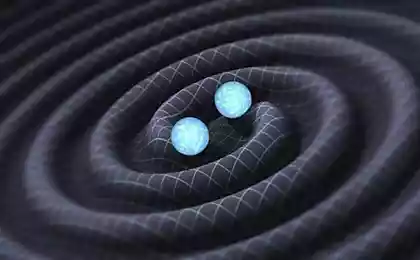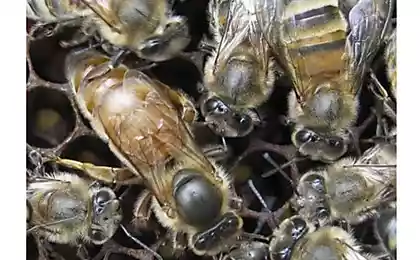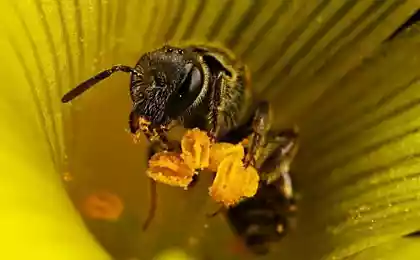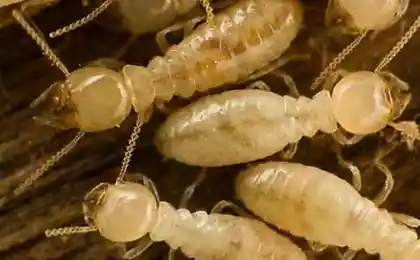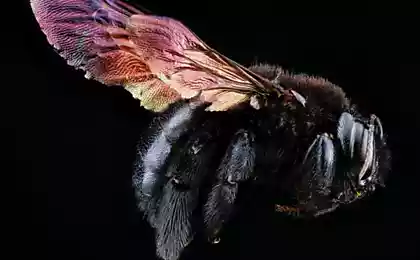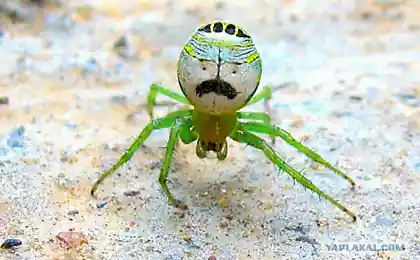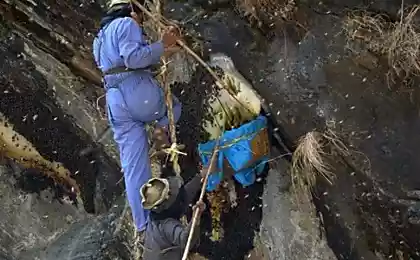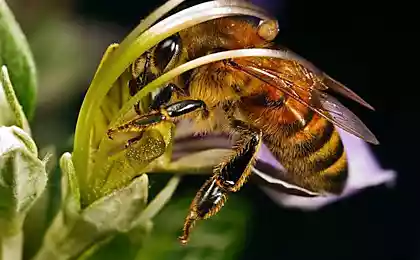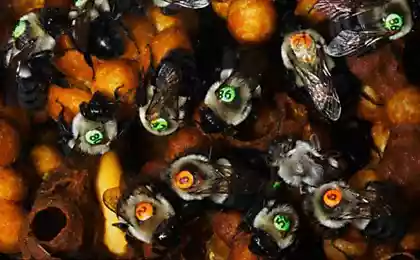579
How to change the world, if the bees disappear
Last year the journal Nature reported last winter that Europe lost 1/3 of the population of honey bees. The threat of extinction becomes real. What will our world be like without the main pollinator? Einstein said that after the bee dies. Scary numbers
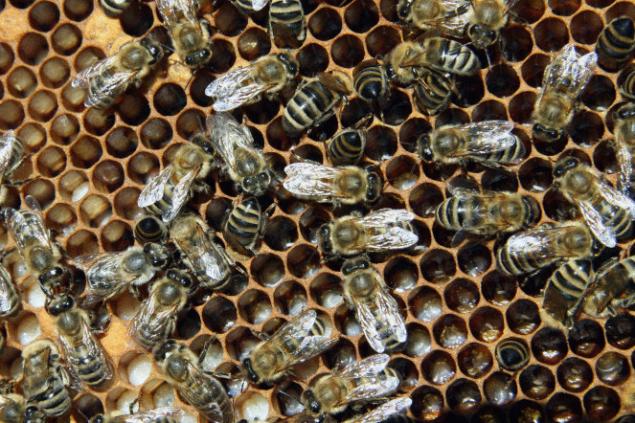
A person can live without oxygen for three minutes, without water for three days, and without bees four years. At least, so says Einstein. Quote of the scientist appeared in 1941 in the journal "Canadian Bee Journal". It follows from this that the death of bees to mankind will be no better global catastrophe — volcanic eruption, meteorite impact or explosion of the large hadron Collider. The result is still the same.
Meanwhile, the mass death of bees continues. The scientific journal Nature reported that in the southern countries over the past winter, the population declined by 5%, in Central Europe by 10-15%, and in the North and is 20%. In Russia, too, not everything went smoothly. The number of hives is greatly reduced especially in Chelyabinsk and Ulyanovsk regions. In the whole country bee mortality is 20%. Experts say that the current number of bees is not enough to pollinate all plants. Last year the UN said that the death rate of bees is becoming a global problem.
What's the problem? The story of the death of melliferous insects is not new: the process was started in the mid-twentieth century but reached a peak in the last twenty years. No single reason, but the main culprit was found — a man. Agriculture is almost universally switched to chemicals – nitrogenous fertilizers, pesticides. The latter does not kill insects, but, according to the researchers, lower their immunity, and viruses are not asleep. Professor Peter Neumann says about the plague of bees — varroa, disease, which carries a microscopic mite: "it is dangerous because the bees sucking out all the life juices. This is the most common bee disease, to get rid of these mites is difficult, and the treatment and nursing of the weakened insects takes a lot of time and rarely lead to the desired results." Yes, and not entitled to the working bee to be sick. Beekeepers don't really care about the health of the members of the hive and continue its business in the usual rhythm: transport a colony of bees over great distances. In the United States transporterowych hives from Florida to California for pollination of agricultural crops. So long trips are subjected to family bees enormous stress. And that leads to "colony collapse disorder". He was described by American beekeepers in 2006. In the course of the "disease" insects leave their colony to ever go there never come back. Solitary bees do not live and soon die away from the hives. The reason for the strange behavior – the chemicals and the radio signals of cellular communication, which, according to scientists from the University of Koblenz-Landau, reduce workers cruise crazy.
What if...? Still, what happens if bees go extinct, or their population reduced to a critical level? Is the prediction of the Einstein — "no bees – no pollination – no food – no man" will come true?
I must say that in the world there are other natural pollinators – flies, butterflies, birds, bats, and wind. In addition, not all plants are pollinated by bees. In the old days without them just fine for the flora of North America and Ireland. There bees brought people.
But since the great geographical discoveries, the world has undergone considerable changes. Increased population, increased demand for products. Today, the loss of bees, which we owe to 1/3 of the total crop, cannot pass without consequences. Humanity will lose more than just honey.
Edition Times and Business Insider lead the chain, referring to the opinion of experts: the greater the mortality among insects, the faster the bee-keeping will become unprofitable. People will start to abandon their craft, and frightening statistics will only worsen. Since bees depend most of the crop, humanity will have to "tighten their belts" — the food stalls are empty, prices on the remaining products soar to the heavens. Will welcome the guests of his Majesty the hunger. And you should not rely on other components of our daily diet. As eliminate the part of the plants, the cattle, too, be deprived of food, and so, good-bye milk, cheese, yogurt and, eventually, beef. In General, anyway, a world without bees will not be able to afford the current human population.
On the background of the previous idea that the person will have problems with clothing just pales. Among other things, bees pollinate cotton. In General, with tags "100%, 50%, and 5% cotton" will have to say goodbye and go for polyester or skins.
Diet of the future , however, will remain hopeful. It will not leave the pig, which does not depend on winged workers. Slightly reduced but will not disappear stocks of some staple food – grain crops, rice, which are pollinated by the wind.
People will find more salvation there, where life began in the ocean. On the fish population itself, the disappearance of bees will not be affected, but if people will take up the matter with its inherent gluttony, the marine life will soon repeat the fate of the insects.
Alternatives at the same time finding solutions to stop the increasing mortality of bees, scientists are looking for a replacement. The first candidate – bumblebee. He also collects honey, only not as tasty as the bees. Bumblebee honey resembles sugar syrup, and yet it is not enough. For comparison, after the honey from two bee families have evacuated 34 kg of honey, and Bumble-bee were selected using the eye dropper (48 g ). But as the pollinator bee, have shown. For example, in some regions of Siberia agriculture have long switched to them. Agronomist Lyudmila Chupina argues that "the industrious bumblebees, and their relatives and their cheaper to maintain". One problem, they too become extinct.
The second potential substitute for the bees. The authors of the study "a World without bees," Benjamin, Alison and Brian Mak Colum immerse the reader in a world where people have learned to live without honey. It's not Earth 2070, and the modern province of Sichuan China. The bees extinct twenty years ago, due to the aforementioned pesticides. Nevertheless, the region remains the largest exporter of pears, which worldwide are pollinated by bees, and here people. Working hand-pollinate the flowers. Inconvenient, costly, but it works.
Another candidate – the robot bee. According to the Guardian, the development of a new assistant today are the engineers of Harvard. Has invented an experimental model. Robots with wings follows the movement of bees and thus pollinate plants. According to scientists, a decade separates them from the completion of the project.
Still, the world needs bees. Once 65 million years ago, nature is ever deleted from the "books of life" of dinosaurs, but the bees left. More precisely, according to biologist Sandra Rehan from the University of new Hampshire, after the complete extinction they were revived again. Perhaps they will survive and humanity. published
Author: Tatiana Singurov
P. S. And remember, only by changing their consumption — together we change the world! ©
Source: russian7.ru/2015/06/kak-izmenitsya-mir-esli-ischeznut-pchely/

A person can live without oxygen for three minutes, without water for three days, and without bees four years. At least, so says Einstein. Quote of the scientist appeared in 1941 in the journal "Canadian Bee Journal". It follows from this that the death of bees to mankind will be no better global catastrophe — volcanic eruption, meteorite impact or explosion of the large hadron Collider. The result is still the same.
Meanwhile, the mass death of bees continues. The scientific journal Nature reported that in the southern countries over the past winter, the population declined by 5%, in Central Europe by 10-15%, and in the North and is 20%. In Russia, too, not everything went smoothly. The number of hives is greatly reduced especially in Chelyabinsk and Ulyanovsk regions. In the whole country bee mortality is 20%. Experts say that the current number of bees is not enough to pollinate all plants. Last year the UN said that the death rate of bees is becoming a global problem.
What's the problem? The story of the death of melliferous insects is not new: the process was started in the mid-twentieth century but reached a peak in the last twenty years. No single reason, but the main culprit was found — a man. Agriculture is almost universally switched to chemicals – nitrogenous fertilizers, pesticides. The latter does not kill insects, but, according to the researchers, lower their immunity, and viruses are not asleep. Professor Peter Neumann says about the plague of bees — varroa, disease, which carries a microscopic mite: "it is dangerous because the bees sucking out all the life juices. This is the most common bee disease, to get rid of these mites is difficult, and the treatment and nursing of the weakened insects takes a lot of time and rarely lead to the desired results." Yes, and not entitled to the working bee to be sick. Beekeepers don't really care about the health of the members of the hive and continue its business in the usual rhythm: transport a colony of bees over great distances. In the United States transporterowych hives from Florida to California for pollination of agricultural crops. So long trips are subjected to family bees enormous stress. And that leads to "colony collapse disorder". He was described by American beekeepers in 2006. In the course of the "disease" insects leave their colony to ever go there never come back. Solitary bees do not live and soon die away from the hives. The reason for the strange behavior – the chemicals and the radio signals of cellular communication, which, according to scientists from the University of Koblenz-Landau, reduce workers cruise crazy.
What if...? Still, what happens if bees go extinct, or their population reduced to a critical level? Is the prediction of the Einstein — "no bees – no pollination – no food – no man" will come true?
I must say that in the world there are other natural pollinators – flies, butterflies, birds, bats, and wind. In addition, not all plants are pollinated by bees. In the old days without them just fine for the flora of North America and Ireland. There bees brought people.
But since the great geographical discoveries, the world has undergone considerable changes. Increased population, increased demand for products. Today, the loss of bees, which we owe to 1/3 of the total crop, cannot pass without consequences. Humanity will lose more than just honey.
Edition Times and Business Insider lead the chain, referring to the opinion of experts: the greater the mortality among insects, the faster the bee-keeping will become unprofitable. People will start to abandon their craft, and frightening statistics will only worsen. Since bees depend most of the crop, humanity will have to "tighten their belts" — the food stalls are empty, prices on the remaining products soar to the heavens. Will welcome the guests of his Majesty the hunger. And you should not rely on other components of our daily diet. As eliminate the part of the plants, the cattle, too, be deprived of food, and so, good-bye milk, cheese, yogurt and, eventually, beef. In General, anyway, a world without bees will not be able to afford the current human population.
On the background of the previous idea that the person will have problems with clothing just pales. Among other things, bees pollinate cotton. In General, with tags "100%, 50%, and 5% cotton" will have to say goodbye and go for polyester or skins.
Diet of the future , however, will remain hopeful. It will not leave the pig, which does not depend on winged workers. Slightly reduced but will not disappear stocks of some staple food – grain crops, rice, which are pollinated by the wind.
People will find more salvation there, where life began in the ocean. On the fish population itself, the disappearance of bees will not be affected, but if people will take up the matter with its inherent gluttony, the marine life will soon repeat the fate of the insects.
Alternatives at the same time finding solutions to stop the increasing mortality of bees, scientists are looking for a replacement. The first candidate – bumblebee. He also collects honey, only not as tasty as the bees. Bumblebee honey resembles sugar syrup, and yet it is not enough. For comparison, after the honey from two bee families have evacuated 34 kg of honey, and Bumble-bee were selected using the eye dropper (48 g ). But as the pollinator bee, have shown. For example, in some regions of Siberia agriculture have long switched to them. Agronomist Lyudmila Chupina argues that "the industrious bumblebees, and their relatives and their cheaper to maintain". One problem, they too become extinct.
The second potential substitute for the bees. The authors of the study "a World without bees," Benjamin, Alison and Brian Mak Colum immerse the reader in a world where people have learned to live without honey. It's not Earth 2070, and the modern province of Sichuan China. The bees extinct twenty years ago, due to the aforementioned pesticides. Nevertheless, the region remains the largest exporter of pears, which worldwide are pollinated by bees, and here people. Working hand-pollinate the flowers. Inconvenient, costly, but it works.
Another candidate – the robot bee. According to the Guardian, the development of a new assistant today are the engineers of Harvard. Has invented an experimental model. Robots with wings follows the movement of bees and thus pollinate plants. According to scientists, a decade separates them from the completion of the project.
Still, the world needs bees. Once 65 million years ago, nature is ever deleted from the "books of life" of dinosaurs, but the bees left. More precisely, according to biologist Sandra Rehan from the University of new Hampshire, after the complete extinction they were revived again. Perhaps they will survive and humanity. published
Author: Tatiana Singurov
P. S. And remember, only by changing their consumption — together we change the world! ©
Source: russian7.ru/2015/06/kak-izmenitsya-mir-esli-ischeznut-pchely/
